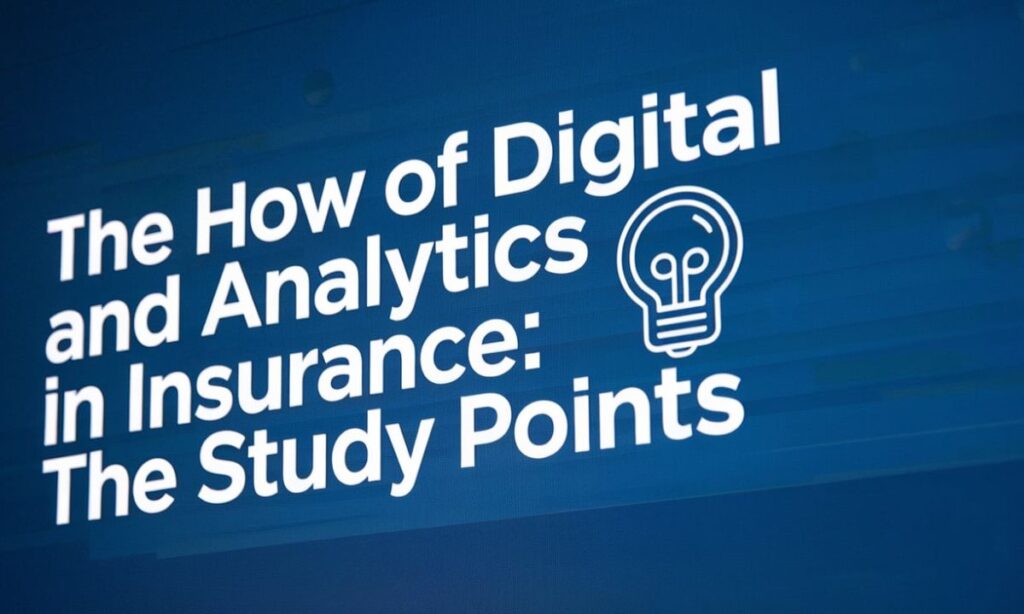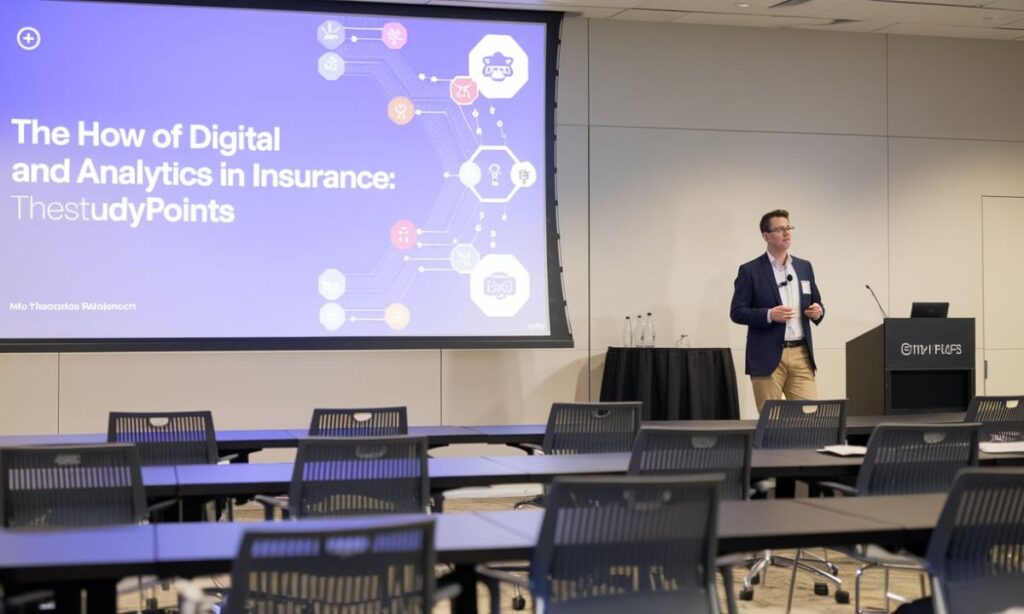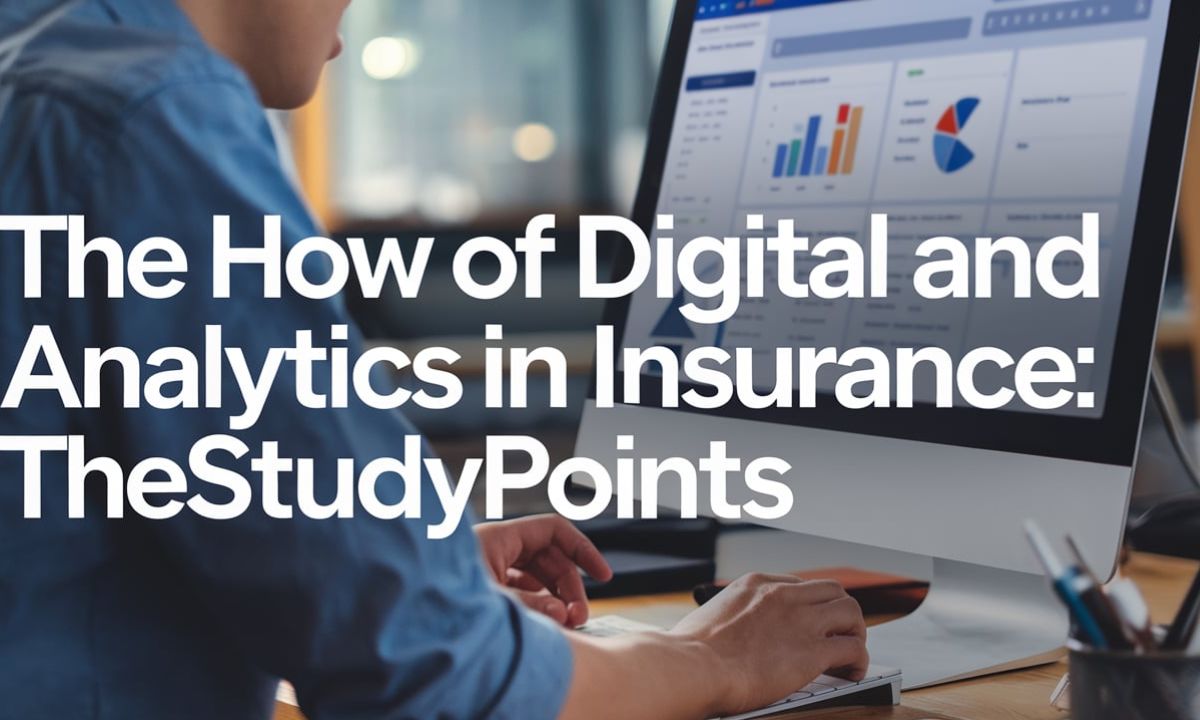The insurance industry is undergoing a profound transformation driven by digital technologies and advanced analytics. These advancements are reshaping how insurers operate, interact with customers, and assess risk.
One platform that offers comprehensive insights into these evolving trends is TheStudyPoints, a hub for professionals aiming to harness the power of digital and analytics in insurance.
In this article, we will delve into how digital transformation and analytics are revolutionizing insurance and explore the pivotal role TheStudyPoints plays in guiding industry professionals.
Digital Transformation in Insurance

Digital transformation in insurance transcends merely adopting new technology; it involves rethinking fundamental business processes to enhance customer engagement, streamline operations, and improve risk assessment. Key digital tools like mobile applications, cloud-based systems, and automation are leading this revolution.
Read this bloghttps://mypascoconnect.co.uk/the-how-of-digital-and-analytics-in-insurance-thestudypoints/
Mobile Technology and Online Platforms
Insurance providers are increasingly leveraging mobile apps and online portals to enhance service delivery. These platforms allow customers to purchase policies, manage their accounts, and file claims with ease. The convenience of accessing services anytime and anywhere has driven higher customer engagement and satisfaction. By embracing digital platforms, insurers reach broader audiences and cater to tech-savvy consumers, creating competitive advantages.
Cloud-Based Systems and Automation
Cloud computing offers flexibility, scalability, and enhanced data security, making it a cornerstone of modern insurance infrastructure. Insurers use cloud-based systems to streamline claims processing, reduce operational costs, and foster collaboration. Automation tools, on the other hand, manage routine tasks like underwriting and policy renewals, minimizing manual effort and human error while accelerating service delivery.
Internet of Things (IoT) in Risk Assessment
The integration of IoT devices in insurance has significantly improved risk assessment accuracy. Devices like telematics in cars and smart home sensors collect real-time data, allowing insurers to evaluate risks dynamically. IoT data-driven policies enable personalized premiums based on actual usage and behavior, encouraging safer practices and reducing losses.
| IoT-Based Risk Monitoring | Impact on Insurance |
| Telematics in vehicles | Usage-based auto insurance analytics |
| Smart home sensors | Reduced property insurance claims |
| Wearable health devices | Customized health insurance premiums |
The Role of Analytics in Modern Insurance

Advanced analytics has become integral to data-driven decision-making in the insurance sector. It empowers companies to assess risk more effectively, detect fraud, and optimize customer interactions.
Predictive Analytics and Risk Assessment
Predictive analytics revolutionizes underwriting by analyzing historical data to predict future claims. Insurers use models to assess risk factors like driving behavior, health conditions, and environmental influences. Personalized policies and pricing structures emerge from these insights, allowing insurers to offer tailored solutions that reflect individual risk profiles.
| Predictive Analytics Use Cases | Impact |
| Assessing health insurance risk | Improved policy pricing accuracy |
| Evaluating auto insurance claims | Tailored usage-based premiums |
| Forecasting weather-related losses | Proactive risk mitigation |
Fraud Detection with Machine Learning
Insurance fraud poses significant financial challenges. By implementing machine learning algorithms, insurers can detect anomalies and suspicious behavior patterns. Continuous data analysis enables real-time fraud detection, safeguarding company assets and maintaining operational integrity.
| Fraud Detection Techniques | Benefits |
| Machine learning algorithms | Enhanced accuracy in fraud detection |
| Claims pattern analysis | Early identification of fraudulent cases |
| Behavioral anomaly detection | Reduced false claims and financial losses |
Customer Segmentation and Personalization
Data analytics enables insurers to segment customers into distinct groups based on behavior, preferences, and demographics. This segmentation supports personalized product offerings, enhancing customer loyalty and satisfaction. For instance, telematics-based car insurance adjusts premiums based on driving habits, rewarding safe drivers with lower costs.
| Segmentation Criteria | Personalized Offerings |
| Demographics | Customized health insurance plans |
| Driving behavior | Usage-based auto insurance |
| Purchase history | Tailored cross-sell opportunities |
Enhancing Customer Experience with Digital Tools
Digital platforms and tools are central to creating customer-centric insurance experiences. AI-driven chatbots, mobile applications, and personalized dashboards provide instant access to policy information and claims support.
AI Chatbots for Customer Support
AI-powered chatbots revolutionize customer service by providing immediate assistance with queries, policy details, and claim submissions. These tools reduce response times and improve user satisfaction while cutting operational costs.
Mobile Technology in Insurance Services
Mobile technology not only simplifies customer interactions but also supports insurers in managing real-time data collection for risk assessment. Advanced mobile apps integrated with machine learning can evaluate user inputs and provide policy recommendations tailored to individual needs.
Insurance Automation Tools for Efficiency
Automation tools streamline various processes, from underwriting to claims management. Technologies like robotic process automation (RPA) handle repetitive tasks, freeing up human resources for strategic decision-making. Automated systems also enhance compliance with regulatory standards by ensuring accuracy and consistency.
Predictive Modeling in Underwriting
Predictive modeling leverages historical data patterns to anticipate future claims. Insurers use sophisticated models to refine underwriting decisions, reduce policy approval times, and provide more accurate pricing.
Usage-Based Auto Insurance Analytics
Usage-based insurance (UBI) offers policies that reflect driving habits, measured through telematics devices. Insurers analyze real-time data to personalize premiums, rewarding low-risk behaviors while mitigating potential losses.
How TheStudyPoints Enhances Digital and Analytics Integration
TheStudyPoints serves as an invaluable resource for insurance professionals navigating the complexities of digital transformation. It offers guidance, real-world examples, and research-based insights.
Technological Integration Guidance
Implementing technologies like artificial intelligence (AI), cloud computing, and predictive analytics requires strategic planning. TheStudyPoints provides step-by-step frameworks to help insurers integrate these tools into legacy systems. It addresses common challenges and solutions for seamless transitions, empowering companies to enhance efficiency and customer service.
Case Studies and Success Stories
TheStudyPoints features detailed case studies highlighting successful digital and analytics adoption in insurance. These examples showcase improved underwriting accuracy, faster claims processing, and elevated customer experiences. Companies gain practical insights into best practices and pitfalls to avoid.
Research and Trend Analysis
Staying ahead of industry trends is crucial. TheStudyPoints regularly publishes articles and reports analyzing emerging technologies and their implications. Insights into AI-driven claims management, blockchain for policy verification, and IoT for risk monitoring equip insurers with a competitive edge.
Big Data Analytics for Insurers

The massive influx of data in the digital age has made big data analytics a cornerstone of modern insurance. Insurers leverage data analytics to identify patterns, optimize marketing strategies, and improve customer retention.
Legacy System Modernization for Insurers
Legacy systems often hinder agility in a fast-paced digital world. Modernizing these systems is essential for integrating advanced technologies like IoT and AI. Strategies for legacy transformation include adopting modular platforms and cloud-native solutions.
Personalized Insurance Policies Through AI
Artificial intelligence enables insurers to design highly personalized policies. By analyzing customer data, insurers can offer flexible coverage options that adapt to changing life events and behaviors.
Cloud-Based Insurance Systems for Scalability
Cloud infrastructure enables insurers to scale operations quickly. Cloud platforms enhance data storage, security, and real-time access, which is critical for claims processing and customer service.
FAQs
What is the role of digital transformation in insurance?
Digital transformation revolutionizes insurance operations by enhancing customer engagement, streamlining processes, and improving risk assessment using technologies like mobile apps, cloud systems, and automation.
How does predictive analytics benefit insurance companies?
Predictive analytics allows insurers to analyze historical data, assess risk accurately, personalize pricing, and offer tailored policies based on individual risk factors.
Why is fraud detection important in insurance?
Fraud detection prevents financial losses by identifying suspicious claims. Advanced analytics and machine learning algorithms improve detection accuracy and safeguard company resources.
How does customer segmentation improve insurance services?
Customer segmentation enables insurers to personalize products based on demographics, behavior, and preferences, leading to improved customer satisfaction and loyalty.
What advantages do cloud-based systems offer insurers?
Cloud-based systems provide flexibility, scalability, and enhanced data security, streamlining operations and reducing costs while fostering collaboration.
How does TheStudyPoints help insurance professionals?
TheStudyPoints offers guidance, case studies, and trend analysis, helping professionals understand and implement digital and analytics strategies effectively.
What are the key trends in digital transformation for insurance?
Key trends include AI-driven claims management, blockchain for policy verification, IoT for risk monitoring, and personalized policy offerings through data analytics.
How can insurers improve operational efficiency?
Insurers can enhance efficiency by adopting automation for routine tasks, leveraging analytics for decision-making, and using digital tools for faster service delivery.
Conclusion
Digital transformation and analytics are reshaping the insurance industry, driving innovation and efficiency.
TheStudyPoints stands as a beacon of knowledge, guiding insurers through this evolving landscape with expert resources and actionable insights.
By embracing these advancements, insurance companies can refine risk assessment, elevate customer experiences, and streamline operations, ensuring long-term competitiveness.
As technology continues to evolve, the insurance sector will witness further innovation. Staying informed through platforms like TheStudyPoints empowers insurers to harness the full potential of digital tools and analytics, positioning themselves for a dynamic and data-driven future.
Read more informationhttps://techyspirtz.com/
Visit my other websitehttps://verbvictories.online/

David is a seasoned SEO expert with a passion for content writing, keyword research, and web development. He combines technical expertise with creative strategies to deliver exceptional digital solutions.














